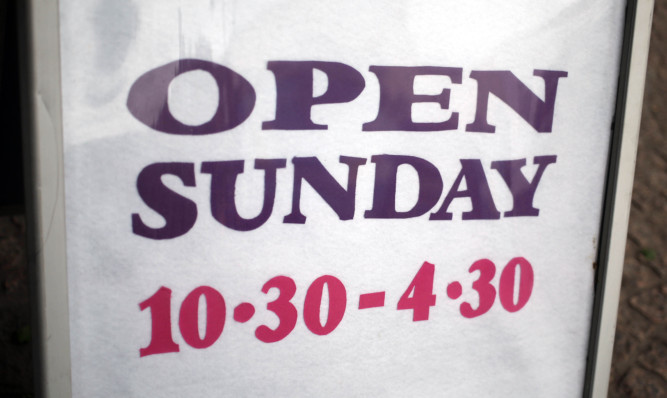The Government is facing the prospect of a damaging Commons defeat over plans to relax the Sunday trading laws in England and Wales after the SNP said it would vote with Tory rebels to block the measure.
The move – after the nationalists had previously indicated they would abstain – infuriated ministers, with one Government source branding their action as “disappointing and hypocritical”.
But Labour called on the Government to accept defeat and drop the changes which would give councils in England and Wales the power to extend Sunday trading hours in their areas.
With up to 30 Tory MPs reportedly planning to defy the whips and vote against the plan – and another 20 said to be ready to abstain – the parliamentary arithmetic appears to be stacked against the Government which has a working majority of just 17.
The SNP decision was announced by deputy leader and economy spokesman Stewart Hosie following a meeting on Tuesday evening following a meeting at Westminster of the party’s 54 MPs.
The nationalists had previously signalled they would not seek to defeat the measure following assurances UK employment laws would be amended to protect workers from being required to work on Sunday against their wishes.
However – following intense pressure from Labour and the shop workers’ union, Usdaw – Mr Hosie said they had concluded that the additional protections did not go far enough.
“We have had Sunday trading in Scotland for some time and the SNP has never been opposed to it, however our concerns here are rooted in the knock-on impact to Scottish workers who would be at risk of pay cuts – many of whom are already suffering from George Osborne’s cuts to tax credits and other in-work support,” he said.
“SNP MPs have considered all sides in this debate and our decision has been made so workers in Scotland are protected.”
A Government source said it was “extraordinary” that a party which campaigned for devolution from Whitehall was now opposing passing more powers to local councils.
“It’s disappointing and hypocritical of the SNP to be trying to deny people the freedoms to shop that are already available to those they represent in Scotland,” the source said.
“It’s a particularly extraordinary position for a party that supposedly believes in devolution of powers from Whitehall to be seeking to stand in the way of local leaders in the rest of the UK being able to choose what’s right for their communities and their economies.”
For Labour, shadow business secretary Angela Eagle said the Government should accept the game was up and that it would not get the changes.
“I am absolutely delighted that good sense seems to have prevailed in the SNP group,” she said. “I now urge the Government to admit defeat and even at this late hour drop these pernicious plans.”
Defeat would be a particularly bitter blow for Chancellor George Osborne who first announced his plan in his summer Budget following last year’s general election victory.
He said that allowing councils in England and Wales to decide whether larger stores should be able to stay open for longer than the current maximum of six hours could help “struggling” high streets to compete with online retailers.
However Labour and the unions have argued that it would lead to an erosion of shop workers’ pay and conditions across the UK while the Church of England has also voiced concern about the impact of the changes.
In contrast to the Tory MPs thought to be planning to rebel, more than 100 leaders of Conservative councils have come out in support of the move.
In a letter to communities and local government minister Brandon Lewis, the politicians ask Parliament “to allow local councils to make decisions on Sunday trading rather than Whitehall”, according to the Financial Times.
“As leaders of our local communities, we want the Government to put its trust into councils,” they wrote. “We are best placed to make decisions about Sunday trading.
“However, to make those decisions in the best interests of our communities it is absolutely vital that these devolved powers come with flexibility, including the ability for councils to zone their Sunday trading so that we can give consideration to a wide range of factors including our local economic circumstances.
“Therefore, we would urge you to continue with proposals to localise these decisions and help us deliver what is best for our local communities.”
